Posts Tagged Bahadir
Day 25 – The Pulse of the Maternal Heart
Posted by Musical Nomad in Daily Blog on August 22, 1997
 There are few female drummers, Evelyn Glennie takes on a male world almost alone. I can’t ever remember seeing female drummers in Africa. For the last couple of days we have been entertained by five women doira players from Kokand. There’s something about the pulse, the heartbeat of the drum that seems close to the maternal spirit, why are there not more female drummers? Rakhimahon Mazokhidova lives her life to a strong rhythm, our interpreter Matluba described her as an entrepreneur worthy of support from BWAK (see day 23). When we met Rakhimahon again in the courtyard of her home, surrounded by children and wild birds, she suggested she sang us a lullaby. No drums just a dignified grandmother singing to an imagined child as many of her real charges now formed an adult audience. I sat spellbound by this charismatic Uzbek star.
There are few female drummers, Evelyn Glennie takes on a male world almost alone. I can’t ever remember seeing female drummers in Africa. For the last couple of days we have been entertained by five women doira players from Kokand. There’s something about the pulse, the heartbeat of the drum that seems close to the maternal spirit, why are there not more female drummers? Rakhimahon Mazokhidova lives her life to a strong rhythm, our interpreter Matluba described her as an entrepreneur worthy of support from BWAK (see day 23). When we met Rakhimahon again in the courtyard of her home, surrounded by children and wild birds, she suggested she sang us a lullaby. No drums just a dignified grandmother singing to an imagined child as many of her real charges now formed an adult audience. I sat spellbound by this charismatic Uzbek star.
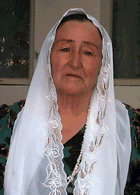 As long as mothers sing to children there’s hope for this world, I hope her many pupils take up this complement to the rattling doira.
As long as mothers sing to children there’s hope for this world, I hope her many pupils take up this complement to the rattling doira.
We set out on an early morning journey from Kokand to Andijan across the valley to track down a lady called Malika Askarova. She had been recommended to us by our music advisor Dr. Razia Sultanova who was born in the area. We had limited time to find her – with a deadline to get across the border into Kyrgyzstan. Our driver Bahadir took the quest into his own hands. At first we did not mind this, it was his last day with us. He thought the town we were looking for was near Fergana. He then repeated a similar pattern of question, answer, drive: 1 Screech to a halt next to someone who looks ‘intelligent’ 2 Shout politely at them for directions to a village they have never heard of. 3 Go whichever way they suggest and finally 4 At the very next junction, usually 3 minutes later, repeat the loop. After two hours of this we had had enough and gave up. By mistake we found ourselves at the village of Durtor. One feature aroused the curiousity of the team. A circular, mud encased building stood bizarrely in the centre of the square. Balanced on top of this hollow mound was a tree complete with roots, precariously balanced. Strangest of all were the carvings on the top – three swan/dragon-like creatures all in motion, facing the same way. I walked inside and saw Arabic inscriptions carved deep into the ceiling, ‘Allah Askadu’ (Allah is Unique). The locals didn’t know the building’s real purpose but said it had been built during the last war, though it looked pretty new.
By mistake we found ourselves at the village of Durtor. One feature aroused the curiousity of the team. A circular, mud encased building stood bizarrely in the centre of the square. Balanced on top of this hollow mound was a tree complete with roots, precariously balanced. Strangest of all were the carvings on the top – three swan/dragon-like creatures all in motion, facing the same way. I walked inside and saw Arabic inscriptions carved deep into the ceiling, ‘Allah Askadu’ (Allah is Unique). The locals didn’t know the building’s real purpose but said it had been built during the last war, though it looked pretty new.
A man stood quietly next to a roundabout “Do you know the town Durdur”, “Yes” he replied and continued knowingly, “I know Malika, she’s my neighbour. I’ll take you there”. Later he said Allah had placed him there so he could take us to her. Who knows?
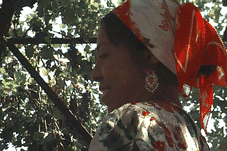 Malika Askarova looks in her forties. She has an expressive and beautiful face which smiles easily. She’s naturally a humble person and could not believe for sometime that we had come to see her. Before long the Uzbek hospitality was bringing us all together and friends and family were gathering to see what was going on. We must have seemed like aliens suddenly arriving out of nowhere in our shiny ‘Nomadmobile’ full of equipment.
Malika Askarova looks in her forties. She has an expressive and beautiful face which smiles easily. She’s naturally a humble person and could not believe for sometime that we had come to see her. Before long the Uzbek hospitality was bringing us all together and friends and family were gathering to see what was going on. We must have seemed like aliens suddenly arriving out of nowhere in our shiny ‘Nomadmobile’ full of equipment.
 Malika is an Otin-Oy or female Sufi. She reads Arabic and studies the ‘old books’ including the works of Ahmad Yasavi – see day 20. She’s called upon for occasions such as weddings and funerals and reads from these old texts in a strong and beautiful voice. She also composes her own songs. When we asked what they were about she explained that she had often been alone in her life, losing her husband when still young. These songs she sang ‘from her heart’ about her life. Malika takes several minutes to prepare herself before singing. Even without understanding the words we could tell they were delivered with considerable emotional force, several of the women present were moved to tears.
Malika is an Otin-Oy or female Sufi. She reads Arabic and studies the ‘old books’ including the works of Ahmad Yasavi – see day 20. She’s called upon for occasions such as weddings and funerals and reads from these old texts in a strong and beautiful voice. She also composes her own songs. When we asked what they were about she explained that she had often been alone in her life, losing her husband when still young. These songs she sang ‘from her heart’ about her life. Malika takes several minutes to prepare herself before singing. Even without understanding the words we could tell they were delivered with considerable emotional force, several of the women present were moved to tears.
We played some recordings to the gathering, Shaykh Kuskarov?s mantra and the Zikr from Kokand. The mantra aroused some curiosity but didn’t seem familiar, however the Zikr induced nods and smiles of recognition. We were told that Malika also performs this Zikr. She became interested in spiritual matters when she was fourteen. Her spiritual mentor was an old woman from the village who also taught her Arabic. Malika’s role is similar to the Kokand women that we met recently. Even though our meeting came about in a strange and unexpected way it seemed quite natural. She has an openness about her that makes you feel welcome and we were all sad to leave.
She became interested in spiritual matters when she was fourteen. Her spiritual mentor was an old woman from the village who also taught her Arabic. Malika’s role is similar to the Kokand women that we met recently. Even though our meeting came about in a strange and unexpected way it seemed quite natural. She has an openness about her that makes you feel welcome and we were all sad to leave.
As the sun slowly falls behind the approaching peaks, we head across the border to Osh.
Tomorrow a mammoth 15 hour journey across Kyrgyzstan to Biskek. We will send a report en-route
Day 17 – Ten Second Tornadoes on the Road to Samarkand
Posted by Musical Nomad in Daily Blog on August 14, 1997
 “The Road to Samarkand” and not a sign of Bing Crosby or Bob Hope (one of Paul’s jokes for the oldies on the web).
“The Road to Samarkand” and not a sign of Bing Crosby or Bob Hope (one of Paul’s jokes for the oldies on the web).
We set off early from Baysun and received a ‘right royal’ send off from the mayor and deputy mayor – they carry our luggage and grip our hands in gratitude for spending time with them and ask us to return. As the ‘Nomadmobile” heads off out of the town a morning light glances low over the Zerafshan ridge. The vertical landscape is dotted occasionally with Yurts, small ‘ten second tornadoes’ and herds of goats. We have to swerve precariously close to the edge of steep gorges narrowly avoiding various bovine animals.
 Our driver, Bahadir who has just had his fifth grandchild, is fully in control. Gradually the heat rises and the hills disappear as we come out of the mountains. A big right turn at Karsi and we are on a fast, flat, perpetually straight road to Samarkand – the only interest being an occasional near vehicle crash either through potholed roads or badly misjudged overtaking. Eventually we near the outskirts of Samarkand and say good-bye to Sasha, he has to catch a bus to Tashkent. “Farewell comrades”, he says.
Our driver, Bahadir who has just had his fifth grandchild, is fully in control. Gradually the heat rises and the hills disappear as we come out of the mountains. A big right turn at Karsi and we are on a fast, flat, perpetually straight road to Samarkand – the only interest being an occasional near vehicle crash either through potholed roads or badly misjudged overtaking. Eventually we near the outskirts of Samarkand and say good-bye to Sasha, he has to catch a bus to Tashkent. “Farewell comrades”, he says.
This trip has had its highs and lows, from the exhilaration of meeting wonderful musicians to the frustration of having no petrol. Through it all one figure seems almost unruffled by anything. Always patient, calm and considered, Sasha, our translator and advisor is a kind of centre of gravity, a point of stability for us. He has been on the road with us now for ten days so is used to our strange ways. He has acted far beyond the call of duty, and his understanding of Uzbek social graces has been invaluable . He always seems to be considering some “problem” (a word he likes to use) or reading a book (preferably in classical Persian). Suddenly something will amuse him and his bearded face will ignite with infectious laughter.

Things work at their own pace here and Sasha understands this better than anyone. It’s easy to forget that this mild mannered man is an accomplished scholar, he wears his learning lightly and doesn’t need to impress anyone.
In one conversation with Sasha I caught a glimpse of the difficulty musicians here face trying to communicate with the outside world. Sasha gave the analogy of an Asian musician trying to describe Beethoven using his own musical terms of reference. Inevitably distortions would arise. This situation compares roughly with the efforts of some European scholars who come to Central Asia to research music. Sasha was at pains to point out that there were Europeans who understood this music better than some local scholars.This problem of unconscious Euro-centrism is something which musicians treat with indulgence here. Sasha kindly added that our project had a completely different brief, to introduce this music to a wide audience.
Patience and wisdom are rare qualities, Sasha possesses them in abundance.
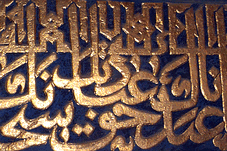
I arrive in Samarkand to find there is no room at the inn (again!). Samarkand only has two ‘bed and breakfasts’ and they’re full. I’m shunted off to a small courtyard with some abandoned bedrooms and parking space for the Nomadmobile. Gary is concerned that we have a clear line of site to the Indian Ocean – whatever that means. (Satellite?) I’m just happy to wash the dust off my feet.

Samarkand is often described as the ‘Pearl of the East.’ The tall madrassahs supporting deep blue domes and the majesty of scale could produce a thousand descriptive superlatives. The city is, like Bukhara undergoing major refurbishment and soon celebrates its 1250th year. It also hosts a week long “Music of the East” Festival starting 25th August, this is one of the biggest events in the area for many years.
The Registan, one of the most celebrated monuments shows signs of preparation – tomorrow I will see it in the dawn light and get you some photos. When we arrive twenty traditional trumpet players rehearse their fanfare and stage positions for the opening ceremony – it reminds me of a Dad’s Army drill. The whole city has a sense of life and movement. Things are changing, fast. There is transition and excitement in the air, music and dance are commonplace on the street and in the specially designated tourist areas. I will explore this more in the next two days. Everywhere in the world, folk culture is presented as entertainment for “package tourists”. Samarkand is no exception. At 6 pm every evening local musicians and dancers re-enact an Uzbek legend with music, mime, puppetry and fire eating. It’s beautifully done and although stylized maintains a joyful innocence.
Everywhere in the world, folk culture is presented as entertainment for “package tourists”. Samarkand is no exception. At 6 pm every evening local musicians and dancers re-enact an Uzbek legend with music, mime, puppetry and fire eating. It’s beautifully done and although stylized maintains a joyful innocence.
 The costumes are probably exaggerated, the music simplified, the legend made larger than life with roaring flame. Yet for all that bemused confused tourists get a taste of a wonderful culture. If they want to know more there are CDs and ‘Musical Nomads’. I was particularly impressed by the doira (frame drum) players with their intricate poly rhythms – I arranged to see them for a detailed session on Usul – the rhythmic patterns of Central Asia. The chang (oriental hammered dulcimer) player is also worth a closer listen.
The costumes are probably exaggerated, the music simplified, the legend made larger than life with roaring flame. Yet for all that bemused confused tourists get a taste of a wonderful culture. If they want to know more there are CDs and ‘Musical Nomads’. I was particularly impressed by the doira (frame drum) players with their intricate poly rhythms – I arranged to see them for a detailed session on Usul – the rhythmic patterns of Central Asia. The chang (oriental hammered dulcimer) player is also worth a closer listen.
Join me tomorrow as we explore the city and meet frame drum and other traditional Uzbek folk musicians – I may even get to meet my first Central Asian flautist
Day 16 – Let us hear your voice
Posted by Musical Nomad in Daily Blog on August 13, 1997
 The journey to Baysun in South Eastern Uzbekistan, today took us over several mountain passes close to the Afghan and Tajik border. The environment is barren and inhospitable with few rivers or lakes to nourish the harsh land. We passed through several suspicious random checkpoints which had no obvious reason for existance – the regional boundaries seem inappropriate in such ‘samey’ terrain. Many of the panoramas call to mind Arizona, mini Grand Canyons appear with extraordinary regularity. As we approached from the West, the sun sets turning the sandy landscape Martian. We round a bend and nestled below a 12,000 ft ridge an apparent oasis comes into view. Baysun is surprisingly large with a population of nearly 23,000; its main sources of income are meat and wheat. It has a large supermarket, a diminutive produce market and a house of culture, complete with 1000 seater cinema.
The journey to Baysun in South Eastern Uzbekistan, today took us over several mountain passes close to the Afghan and Tajik border. The environment is barren and inhospitable with few rivers or lakes to nourish the harsh land. We passed through several suspicious random checkpoints which had no obvious reason for existance – the regional boundaries seem inappropriate in such ‘samey’ terrain. Many of the panoramas call to mind Arizona, mini Grand Canyons appear with extraordinary regularity. As we approached from the West, the sun sets turning the sandy landscape Martian. We round a bend and nestled below a 12,000 ft ridge an apparent oasis comes into view. Baysun is surprisingly large with a population of nearly 23,000; its main sources of income are meat and wheat. It has a large supermarket, a diminutive produce market and a house of culture, complete with 1000 seater cinema.
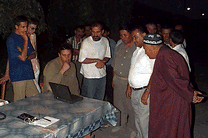 When we arrived there was some confusion as the famous Baysun ensemble had left town. They had been sent for a two week ‘gig’ in Tashkent and were our only form of contact – initially we were asked to leave.
When we arrived there was some confusion as the famous Baysun ensemble had left town. They had been sent for a two week ‘gig’ in Tashkent and were our only form of contact – initially we were asked to leave.
After the shock died down the town’s officials began to buzz around us. What to do? Some people from another land had descended on their town. There followed a lengthy approval procedure, we were taken to Turakul Hamraev’s office (Baysun’s Mayor) – a yard with a table and phone. We had to explain our mission, do an impromtu Multimedia presentation and smile a lot at the various dignitaries. After an hour or so of ‘checking’ each other out we were suddenly honored guests – the transition into that mode almost lost on a tired ‘Nomad’ team. Many of the local musicians were also in the throng. Another musician we wanted to meet, Shoberdy Bakshy who had now been told to spend time with us tomorrow and to cancel a financially lucrative wedding ceremony.
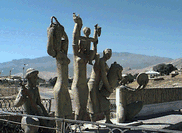 Once accepted we received a welcome of such kindness and honesty that we were at first very disconcerted. The deputy major of the Baysun region, Samariddin Mustafakulov had been given the unenvious job of looking after us at 9 pm. He opened a restaurant for us to eat after our long trip, he made available at a moments notice, a Daja (a summer house in the past used by Russian officials) and he even waited at our late night table plying us with vodka. Throughout the coming day he would accompany us everywhere, standing over the lengthy video and audio recordings, following us into the mountains for a location shoot with the Bakshy singer – making sure we were happy and at every moment filling our chai cups with vodka. Ourstandard refusal of we have too much work to do eventually worked.
Once accepted we received a welcome of such kindness and honesty that we were at first very disconcerted. The deputy major of the Baysun region, Samariddin Mustafakulov had been given the unenvious job of looking after us at 9 pm. He opened a restaurant for us to eat after our long trip, he made available at a moments notice, a Daja (a summer house in the past used by Russian officials) and he even waited at our late night table plying us with vodka. Throughout the coming day he would accompany us everywhere, standing over the lengthy video and audio recordings, following us into the mountains for a location shoot with the Bakshy singer – making sure we were happy and at every moment filling our chai cups with vodka. Ourstandard refusal of we have too much work to do eventually worked.
The Soviet’s pulled out of this area and indeed the whole of Uzbekistan back in 1992. The control reverted back to the indigenous people who retained many of the Soviet ways. Here in Baysun there is the remarkable combination of a warm and friendly people living in the shadow of the past – things have moved on but at a far decelerated pace.
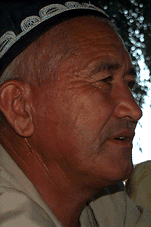 Sometimes musicians are more than just players of music. Sometimes concert pianists disappear into a world of their own creation – lost in music. Jazz musicians talk of being ‘high on music’ and anyone lucky enough to play an instrument occasionally feels that sense of the music taking over. When Shoberdy Bakshy sings, gently thrumming on his dombra, clocks pause. His voice is a low chested throb rising to a scream. His dombra dances with the rhythm of something anciently human. Short songs in his repertoire last 20 minutes, the long ones several days. For us he wishes to record a 2-hour epic – our longest tape lasts merely 60 minutes. Shoberdy composes on the spot, taking an old theme and reweaving it into a new opus featuring all members of the “Musical Nomad”.
Sometimes musicians are more than just players of music. Sometimes concert pianists disappear into a world of their own creation – lost in music. Jazz musicians talk of being ‘high on music’ and anyone lucky enough to play an instrument occasionally feels that sense of the music taking over. When Shoberdy Bakshy sings, gently thrumming on his dombra, clocks pause. His voice is a low chested throb rising to a scream. His dombra dances with the rhythm of something anciently human. Short songs in his repertoire last 20 minutes, the long ones several days. For us he wishes to record a 2-hour epic – our longest tape lasts merely 60 minutes. Shoberdy composes on the spot, taking an old theme and reweaving it into a new opus featuring all members of the “Musical Nomad”.
The biggest frustration of travelling is not being able to share experiences with the ‘folks’ back home. Here we have the immediacy of satellite communication, sharing a moment with the World. My ‘moment’ today was driving through the mountains sitting next to Shoberdy who was singing his song about our arrival in Uzbekistan. Sasha, Bahadir, the deputy mayor, everyone was in the story – each laughted and nodded as their name was mentioned. It suddenly struck me that he was doing exactly what we were doing, telling a story live, responding to the environment. This spontaneity affected me more than anything else.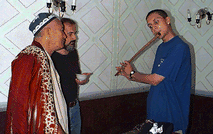 In interview he spoke of his songs of friendship, love and nature. In the presence of the microphone he declined to speak of Shamanism – he just oozes ‘spirit’ from the ends of his calluosed fingers. Shoberdy Bakshy is a wild man who dances to a different drum and drinks vodka like water. May he live a long and mysterious life.
In interview he spoke of his songs of friendship, love and nature. In the presence of the microphone he declined to speak of Shamanism – he just oozes ‘spirit’ from the ends of his calluosed fingers. Shoberdy Bakshy is a wild man who dances to a different drum and drinks vodka like water. May he live a long and mysterious life.
Tomorrow – Samarkand. We take the ‘Golden Road’ to discover the music of the ‘Pearl of the East’.
Day 15 – Bukhara to Baysun, into the mountains at last
Posted by Musical Nomad in Daily Blog on August 12, 1997
 Before setting off from Bukhara this morning, we called in at the workshop of an instrument maker, Karomat Mukimov. It was not long before we were surrounded by the master’s young apprentices and were being shown the intricacies of tuning tars. Karomat and Sasha had been at the Tashkent Conservatory together 23 years ago, so there was a mini reunion going on. Amongst the instruments in his shop was a tanbur from the nineteenth century, it had been lovingly restored by this master. It transpired that the tanbur had once belonged to Leviche Babakhanor, grandfather of Ari (a musician we met three days ago). This news came as something of a shock. Why would the family sell such a beautiful instrument? It was heavily inlaid and was quite obviously made for an important player. Sasha told us that Ari had referred to an instrument of Leviche’s which had been sold to a maker. This tanbur was an antique with historical value, having belonged to one of the last Bukharan court musicians. Here it was for sale. Admittedly not cheap, but we would have been free to take it abroad. It crossed our minds to buy it and give it back to Ari – where it belonged. The story went that one of Ari’s brothers had gone to live in Israel and had exchanged this instrument for an new one. It seemed sad to see it here but at least it was now restored and perhaps would end up in the hands of a player.
Before setting off from Bukhara this morning, we called in at the workshop of an instrument maker, Karomat Mukimov. It was not long before we were surrounded by the master’s young apprentices and were being shown the intricacies of tuning tars. Karomat and Sasha had been at the Tashkent Conservatory together 23 years ago, so there was a mini reunion going on. Amongst the instruments in his shop was a tanbur from the nineteenth century, it had been lovingly restored by this master. It transpired that the tanbur had once belonged to Leviche Babakhanor, grandfather of Ari (a musician we met three days ago). This news came as something of a shock. Why would the family sell such a beautiful instrument? It was heavily inlaid and was quite obviously made for an important player. Sasha told us that Ari had referred to an instrument of Leviche’s which had been sold to a maker. This tanbur was an antique with historical value, having belonged to one of the last Bukharan court musicians. Here it was for sale. Admittedly not cheap, but we would have been free to take it abroad. It crossed our minds to buy it and give it back to Ari – where it belonged. The story went that one of Ari’s brothers had gone to live in Israel and had exchanged this instrument for an new one. It seemed sad to see it here but at least it was now restored and perhaps would end up in the hands of a player.
My thoughts now turned to a doira, a frame drum, that I had seen several days before, but had then seemed absurdly overpriced. Whether it was the effect of half an hour of conversation, or Sasha’s connection with the instrument maker, I’ll never know, but the price suddenly dropped by a third. We struck a deal and I walked away the proud owner of a high quality doira. Now all I have to do is persuade someone to show me a few tricks.
 This project involves plenty of travelling around Central Asia. After all I am the ‘Musical Nomad’. Of course the truth of the matter is I am accompanied by a small, specialist team. Our ‘nomad horse’ for the last two weeks is a Volkswagen Caravelle, with enough seats for six people and five large flightcases.In Central Asia a driver is more than simply a driver, he constantly nurses and cleans the car, never leaves it and finds petrol in the most unlikely places. Our Uzbek driver Bahadir is a real character and devout individual. He is a stout man with a face half resembling Mel Brooks and a sleepy manner. We were amused watching Bahadir buying petrol. He would chase lorry drivers, hug and kiss them and spend hours in the back yard of strangers.
This project involves plenty of travelling around Central Asia. After all I am the ‘Musical Nomad’. Of course the truth of the matter is I am accompanied by a small, specialist team. Our ‘nomad horse’ for the last two weeks is a Volkswagen Caravelle, with enough seats for six people and five large flightcases.In Central Asia a driver is more than simply a driver, he constantly nurses and cleans the car, never leaves it and finds petrol in the most unlikely places. Our Uzbek driver Bahadir is a real character and devout individual. He is a stout man with a face half resembling Mel Brooks and a sleepy manner. We were amused watching Bahadir buying petrol. He would chase lorry drivers, hug and kiss them and spend hours in the back yard of strangers.
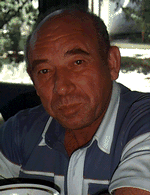 Our delicate computer, communications and audio/video equipment are at the mercy of his driving skills and we all too often have to tell him, through Sasha, to ‘slow down!’ This gets lost in the translation as within minutes we are once again careering through potholed hairpin bends. Bahadir also has an uncanny ability to forget things – only basic things such as which town we asked to stop in!. With all his faults though he has some key redeeming features – his devotion to his religion and his mild manner which conceals a strength alien to many in the West.
Our delicate computer, communications and audio/video equipment are at the mercy of his driving skills and we all too often have to tell him, through Sasha, to ‘slow down!’ This gets lost in the translation as within minutes we are once again careering through potholed hairpin bends. Bahadir also has an uncanny ability to forget things – only basic things such as which town we asked to stop in!. With all his faults though he has some key redeeming features – his devotion to his religion and his mild manner which conceals a strength alien to many in the West.
Yurts and oil wells line the improbable road to Baysun. A semi desert of stunted shrubs strectches to a hazy horizon. The mode of transport switches from dodgy trucks to lively donkeys, laden with unknown produce bound for market.
I n many Islamic countries you wield a camera at your peril. In Tunisia for example, even pointing a camera at a person is considered deeply offensive. I entered the lively market at Karsi full of trepidation. Everywhere the rich fruit colours of high summer beg for Kodachrome. Reds in apples and tomatoes, golden yellow pears, grapes, as black as night. In direct competition for photogenic appeal were the gorgeous Tajic clothes of the Uzbek women. I gestured to my camera with a thumbs up and a smile – smiles were returned. Suddenly I was the most popular guy in town – everybody wanted to be photographed and video’d. It gets better. The fruit sellers started to compete for my attention by paying me in fruit. I left the market laden with bags, totally bemused but thrilled. The generosity of these people had been such a surprising contrast.
n many Islamic countries you wield a camera at your peril. In Tunisia for example, even pointing a camera at a person is considered deeply offensive. I entered the lively market at Karsi full of trepidation. Everywhere the rich fruit colours of high summer beg for Kodachrome. Reds in apples and tomatoes, golden yellow pears, grapes, as black as night. In direct competition for photogenic appeal were the gorgeous Tajic clothes of the Uzbek women. I gestured to my camera with a thumbs up and a smile – smiles were returned. Suddenly I was the most popular guy in town – everybody wanted to be photographed and video’d. It gets better. The fruit sellers started to compete for my attention by paying me in fruit. I left the market laden with bags, totally bemused but thrilled. The generosity of these people had been such a surprising contrast.
 In the cities of the former Soviet Union the legacy of too many conquering Tzars and an autonomous state is a frozen fear still reflected in faces. Here in the country people further from the hub of beaurocracy seem to retain an earlier innocence. As we arrive in Baysun unannounced in the early evening, word spreads fast. Soon a whole greeting committee turn out to welcome us to this small town in the mountains famous for its music.
In the cities of the former Soviet Union the legacy of too many conquering Tzars and an autonomous state is a frozen fear still reflected in faces. Here in the country people further from the hub of beaurocracy seem to retain an earlier innocence. As we arrive in Baysun unannounced in the early evening, word spreads fast. Soon a whole greeting committee turn out to welcome us to this small town in the mountains famous for its music.
Tomorrow the ‘Bakshy of Baysun’.